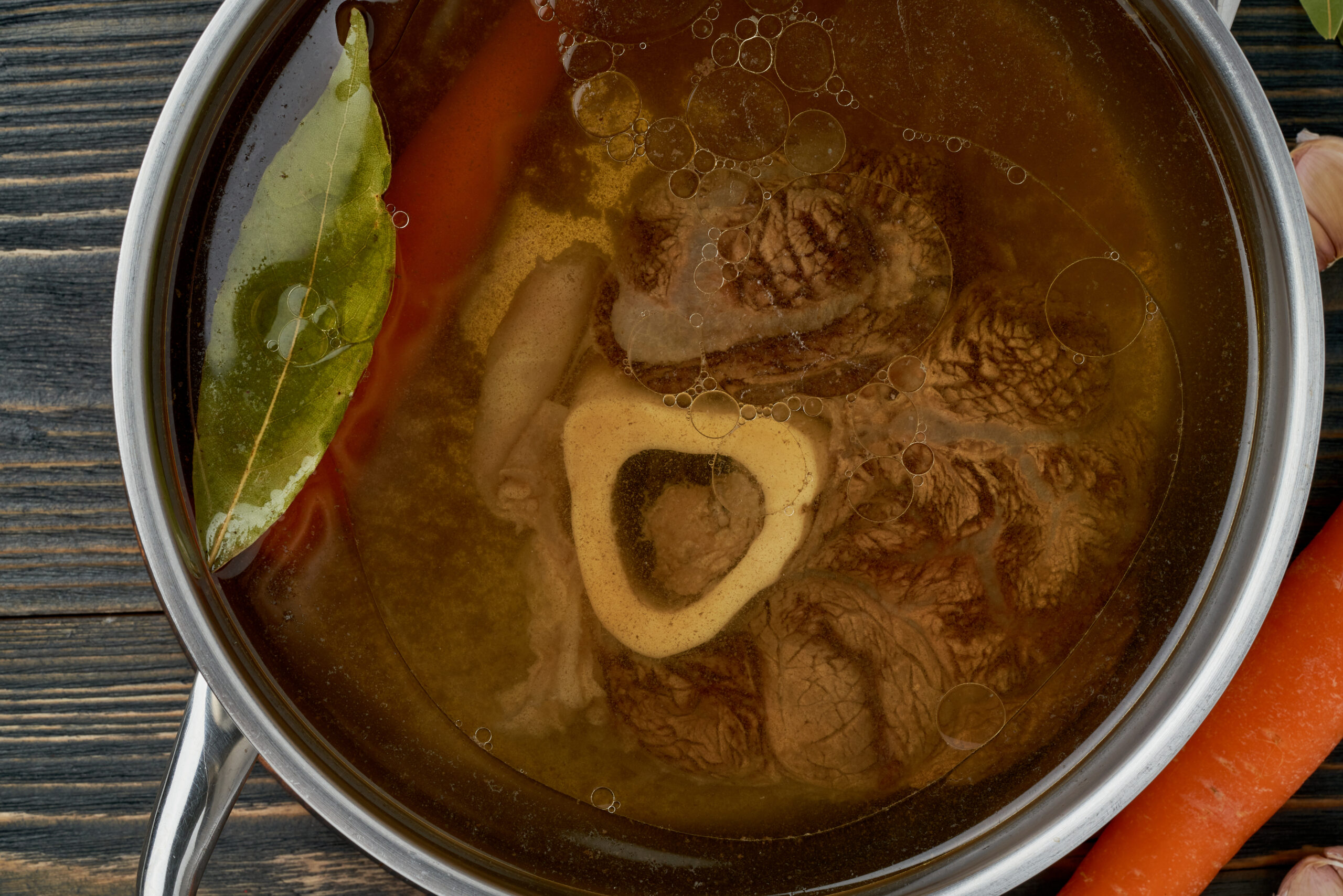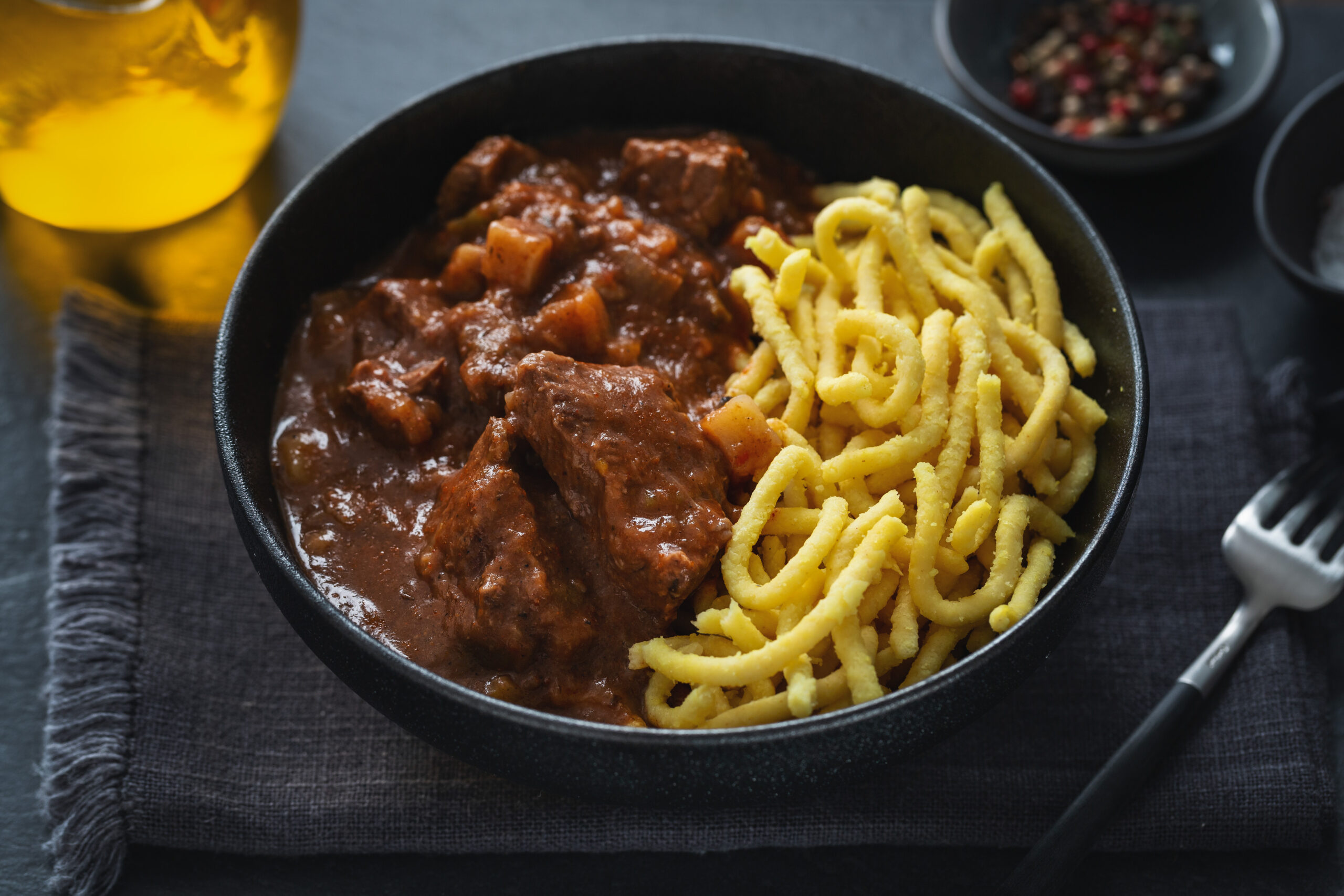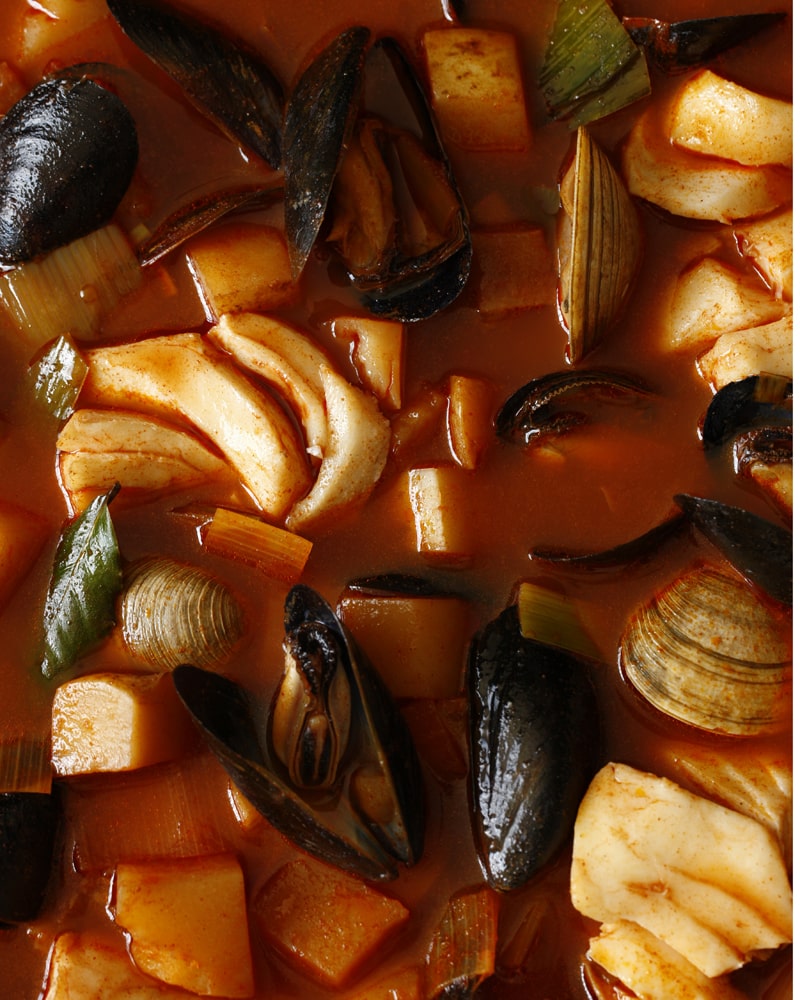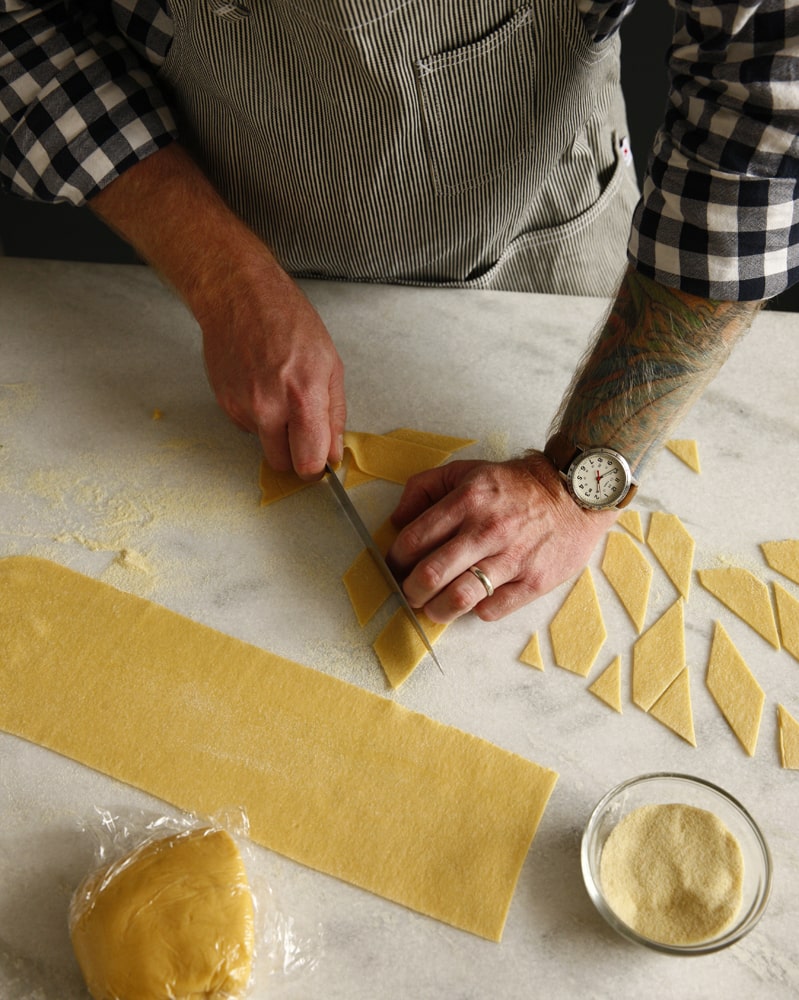I love stumbling upon a dish that completely surprises me. Even though I’ve had this side before and have made it myself, I loved this version I had in Munich on a recent trip. Speckrahmwirsing, a creamy, smoky, and flavorful side that I encountered at Andechser am Dom in Munich is one that as soon as I tasted it I knew I wanted to recreate it. It was creamy and smoky and salty in a good way. It was the perfect side to the Frikadellen, or Fleischpflanzerl as they call it in Munich. Andechser am Dom, nestled in the heart of the city, just steps away from Frauenkirche, serves up the quintessential Bavarian experience, complete with hearty dishes and welcoming hospitality and of course their famous beer. And while there were plenty of tempting options on the menu, it was this humble cabbage dish that completely stole my heart.
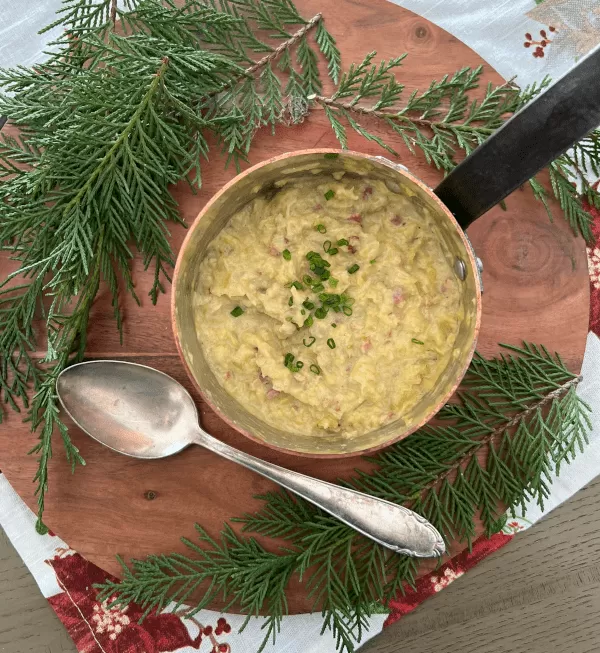
What is Creamed Savoy Cabbage?
The name, Speckrahmwirsing translates to “savoy cabbage with bacon and cream,” which might sound simple on paper, but its flavor profile is anything but ordinary. The key lies in its balance—each component complements the others to create a dish that feels indulgent yet grounded in tradition. The bacon brings a robust smokiness, the cream adds luxurious richness, and the cabbage provides a tender, slightly sweet base. When seasoned with a touch of nutmeg, garlic, and salt, it transforms into something that feels both rustic and refined.
At Andechser am Dom, the creamed savoy cabbage was served with Fleischpflanzerl or Frikadellen. The cabbage side was soft and tender enough to melt in your mouth. The cream clung to every leaf, and the speck added little pops of umami with every bite. It was salty in a good way. I remember savoring it slowly, trying to pinpoint what made it so addictive. Was it the faint hint of nutmeg, or the way the smoky bacon fat had seeped into the broth? Perhaps it was the way the dish balanced richness and freshness, making it both hearty and light enough to enjoy with the meal’s other heavy hitters.
After that meal, I knew I had to recreate Speckrahmwirsing at home. Whether you’re looking to evoke memories of Bavarian beer halls or simply want to elevate a humble vegetable into something spectacular, this dish is worth adding to your repertoire.
The following recipe is my interpretation, honed through trial and error to recreate the flavors I experienced in Munich. While the ingredients are simple, the technique is key to achieving the perfect balance of creaminess and flavor. Here’s how you can make Speckrahmwirsing at home.
Creamed Savoy Cabbage Ingredients
1/2 savoy cabbage
4 slices of bacon (or speck), diced
1 cup heavy cream
1/4 teaspoon grated nutmeg
Salt to taste
1 cup vegetable broth
1 clove garlic, minced
1/2 tsp sugar
Instructions
- Prepare the Cabbage
Remove the outer leaves of the savoy cabbage and cut it in half. Slice one half into thin strips, discarding the tough core. Rinse the strips thoroughly under cold water and set them aside to drain. - Cook the Bacon
In a large skillet or saucepan, cook the diced bacon over medium heat until it renders its fat and becomes crispy. Use a slotted spoon to remove the bacon bits and set them aside, leaving the rendered fat in the pan. - Sauté the Garlic and Cabbage
Add the minced garlic to the pan with the bacon fat and sauté for 30 seconds, just until fragrant. Then, add the cabbage strips to the pan and stir to coat them in the fat. Cook for about 5 minutes, stirring occasionally, until the cabbage begins to soften. - Add the Broth and Cream
Pour in the vegetable broth, heavy cream, and sugar, stirring to combine. Lower the heat to a simmer and let the mixture cook for about 20 minutes, or until the cabbage is tender and the liquid has slightly thickened. - Season and Finish
Stir in the grated nutmeg and season with salt to taste. Return the crispy bacon bits to the pan and mix well. Let the dish cook for another minute to warm through and meld the flavors. - Serve
Serve the Speckrahmwirsing immediately, either as a side dish or on its own with a slice of fresh bread. For an authentic Bavarian experience, pair it with roasted pork, bratwurst, or a tall glass of wheat beer.
Final Thoughts
Speckrahmwirsing is proof that the simplest ingredients can come together to create something extraordinary. Whether you’re reminiscing about a trip to Munich or discovering this dish for the first time, I hope it brings a little bit of Bavarian comfort to your table. For me, it’s a delicious reminder of the meal that made me fall in love with cabbage all over again. Enjoy!
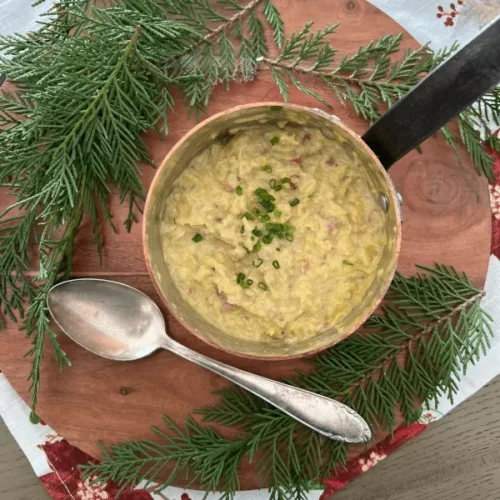
Speckrahmwirsing – Creamed Cabbage & Bacon
Ingredients
- 1/2 savoy cabbage
- 4 slices of bacon or speck, diced
- 1 cup heavy cream
- 1/4 teaspoon grated nutmeg
- Salt to taste
- 1 cup vegetable broth
- 1 clove garlic minced
- 1/2 tsp sugar
Instructions
Prepare the Cabbage
- Remove the outer leaves of the savoy cabbage and cut it in half. Slice one half into thin strips, discarding the tough core. Rinse the strips thoroughly under cold water and set them aside to drain.
Cook the Bacon
- In a large skillet or saucepan, cook the diced bacon over medium heat until it renders its fat and becomes crispy. Use a slotted spoon to remove the bacon bits and set them aside, leaving the rendered fat in the pan.
Sauté the Garlic and Cabbage
- Add the minced garlic to the pan with the bacon fat and sauté for 30 seconds, just until fragrant. Then, add the cabbage strips to the pan and stir to coat them in the fat. Cook for about 5 minutes, stirring occasionally, until the cabbage begins to soften.
Add the Broth and Cream
- Pour in the vegetable broth, heavy cream, and sugar, stirring to combine. Lower the heat to a simmer and let the mixture cook for about 20 minutes, or until the cabbage is tender and the liquid has slightly thickened.
Season and Finish
- Stir in the grated nutmeg and season with salt to taste. Return the crispy bacon bits to the pan and mix well. Let the dish cook for another minute to warm through and meld the flavors.
Serve
- Serve the Speckrahmwirsing immediately, either as a side dish or on its own with a slice of fresh bread. For an authentic Bavarian experience, pair it with roasted pork, bratwurst, or a tall glass of wheat beer.

